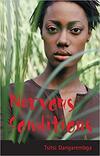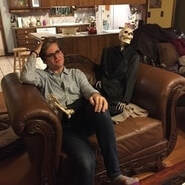Sacred Chickens
Menu
SACRED CHICKENS
 Nervous Conditions Author, Tsitsi Dangarembga Review by Jarad Johnson I’m taking a course on narratives in African Literature this semester, and part of that means reading books by authors that probably would not normally fall under my purview. Part of being a reader is, by default, being a lifelong learner, and I’m very pleased when I get exposed to new ideas, cultures, and experiences…one of the reasons I took this class (it’s also taught by one of my favorite teachers). The course focuses on narratives, which is a topic that this blog likes to focus on as well. This book in particular is one that I read around a month ago, and it is arguably my favorite so far. I’ve waited this long to review it, so I can gather my thoughts about it. It is a decidedly feminist text, focusing on the role of women in African society through the eyes of a headstrong and confident teenager named Tambu. However, when I say that the novel is about gender, it inherently cannot be about just that. It also focuses on race, colonialism, and class within Tambu’s society, because to be a woman (or a person in general, for that matter) doesn’t mean that you exist in a vacuum; those other things impact your experience in life. This is an illustration of intersectionality: a woman’s intersectional experience, mitigated by class, race, and a whole host of other issues. This novel is compelling because it is constantly aware of all of the thread of its context. Don’t assume that when you pick up a novel set in Africa that the struggles will be foreign to you, totally different that those in a novel set in the US; there are certain issues that every society and culture struggles with, and it is a mark of good writing that this novel reflects those universal problems. One of the great things about reading books it that it teaches you that, even across the globe, separated by language and culture, we are more alike than we are different. The society that Tambu grows up in is similar to ours, only amplified. Her family lives in abject poverty, and both she and her brother are sent to school until there isn’t enough money for both of them. Her brother is prioritized, because the surrounding culture inherently values men above women. At every point in every day, she is reminded of this. She is made to work in the fields with her mother, while her father doesn’t have to. Her father and brother are even given better food than her. She is told to obey her father (and by extension, all men) without question. She has no agency, no personhood, no sense of self, because her society doesn’t recognize her as such. From a very young age, she realizes these attitudes are wrong and don’t fit her, and instead of thinking that she herself is wrong, she begins to think that her father is the one that is incorrect. I was reminded of a famous quote by Sojourner Truth, when she is arguing against the position that men are better than women because Jesus was a man. She says, “Where did your Christ come from? From God and a woman! Man had nothing to do with him.” If I could, I would work that quote into every conversation. But I was reminded of that quote quite often throughout the novel, and I would’ve loved to see the look on the men’s faces in this novel if they heard it. This is not a book about men. They are background characters, often two dimensional, and are there to serve more as reminders of the patriarchal institution that they represent more than anything. I think there’s a lot of symbolism in the choice to make them so uninteresting, an example of how patriarchy makes men emotionally stunted, and also supremely boring. Dangarembga has essentially put men where you would classically find female characters; in the background. However, unlike classic female characters, they are the ones that hold all the power and authority. Or, at least they think they do. The masculine ego, although big and boisterous, is a fragile thing, and must be appeased and cultivated by an extraordinary amount of supplication and preening. Without the women of the novel, men would be nothing. I remember discussing this in class, and after we read a line that said women are supposed to be the ones who instilled culture into the next generation, I found myself mildly irritated. Women cook, clean, bear children, work in the fields, go without proper nutrition, and look after the men, and now I’m reading that they are supposed to do this too? I said something that I’ve said before when I become cross, which is, “Could someone please tell me what precisely is it that men do?” If you could read that with a heavy amount of sarcasm, that will probably help. It just goes to show how society privileges men and the masculine. I said that the masculine ego is fragile, and the novel shows us that nearly constantly, mostly by illustrating how all the men need the women around them to obey them without question. They cannot be challenged, and above all they cannot be laughed at. Yesterday, I took a few hours to read the Mysterious Stranger (also called the Chronicles of Young Satan) by Mark Twain. In it is a line that I will never forget. He says that you can push at power with supplication, persuasion, and persecution, but, “only laughter will blow it to rags and atoms at a blast. Against the assault of laughter nothing can stand.” That is why they cannot bear to be laughed at, because laughter deprives them of their power and their seriousness. Near the end of the novel, Tambu tells us how she has “escaped,” from all of these things, these patriarchal institutions. She’s basically surrounded by women now, and you have to wonder how much of an escape that really is. She can remove herself from the men themselves, but when you are born into a patriarchal society, its values are instilled into you, and it is very hard to undo. The women around Tambu will still have the values of patriarchy. No, this can’t be her escape. Her escape, I think, is a freedom of the mind. She has long since recognized that some of the values of patriarchy aren’t advantageous to her, but by the end she has completely rejected it, and has freed herself and her mind from that. That is a remarkable thing and so by extension is this book.  Bio Jarad is the co-administrator and writer for Sacred Chickens, attends college at MTSU, loves tea and coffee, and tries to spend every spare second reading. He recently developed an interest (some might say obsession) with gardening. Jarad is an English major with a concentration in literature. Bless his heart! Let's all light a candle for him and send him happy thoughts!
0 Comments
Leave a Reply. |

Click Photo above to buy ebook or paperback from Amazon.
Here's the link to Barnes and Noble Or order through your favorite independent bookstore! Categories
All
|
 RSS Feed
RSS Feed